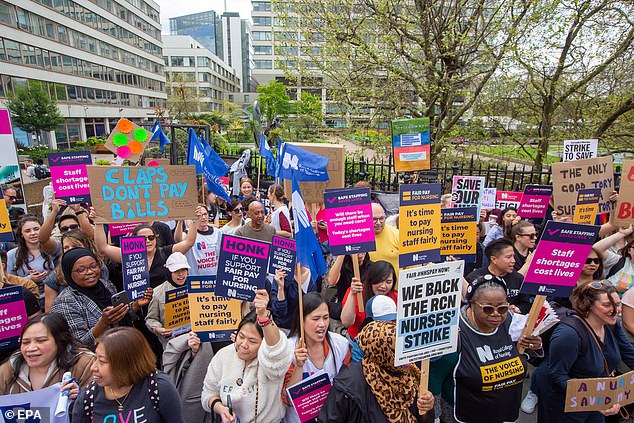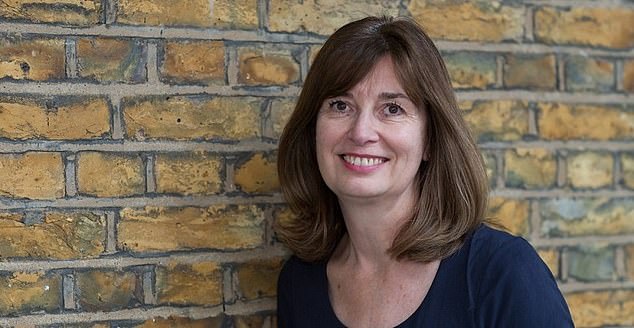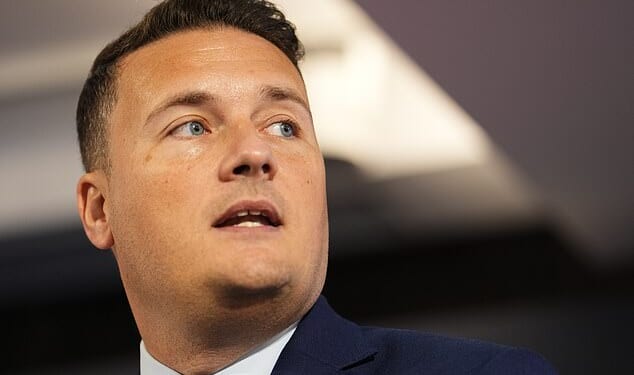Newly qualified nurses are being forced to consider working in hospitality due to a chronic shortage of available jobs – despite an ongoing shortfall of nurses nationwide.
Earlier this month the Royal College of Nursing (RCN) warned there are not enough nurses to meet patients’ needs.
Around 81 per cent of nurses agree, latest analysis by the nursing body shows, while there are around 34,000 vacancies with ‘shortages in every setting’.
‘We’ve all experienced working with short staffing. It’s almost become ubiquitous in working with the NHS,’ one nurse said.
Despite understaffing, many freshly qualified nurses are struggling to find jobs, with some turning to pub or bar jobs.
Rachel White, 21, a newly qualified nurse, told the Daily Mail she has applied for positions in at least four different cities.
She has had to consider temporary hospitality work despite working 48-hour weeks at hospitals, alongside studying, throughout her training.
‘I am really trying my hardest to get a nursing job but I can’t really afford rent so if it comes down to it I’ll have to get a job in hospitality in the meantime,’ she said.

Health Secretary Wes Streeting last month admitted ‘it is absurd that we are training thousands of nurses and midwives every year, only to leave them without a job before their career has started’

Last week the Royal College of Nursing (RCN) warned there are not enough nurses to meet patients needs
‘I know a lot of people who are doing the same, who will have to work in a bar or something while they struggle to get a job and interviews.’
As of last month there were 4,000 more nursing and midwife graduates than vacancies, in what has been termed a ‘newly registered nurse jobs crisis’.
Some university lecturers have even warned their students they could face more than a year of job hunting after qualifying, while the Government admitted there are up to three times as many graduates as there are vacancies in some areas.
Ms White said: ‘On my very last day at university my seminar leader said “best of luck” and then said “by next year 50 per cent of you still won’t have a job”.
‘I started to look in March and there weren’t many jobs going and most said you needed at least six months experience.
‘At the end of May I saw maybe three posts and I was constantly checking every other day and that’s been the case until now. It’s disheartening
‘I’ve looked in Manchester, Liverpool, Durham and Birmingham.
‘I am very frustrated because I have just finished and it seems there’s no job for me.

Around 81 per cent of nurses agree there are not enough nurses to meet patients needs while there are around 34,000 vacancies with ‘shortages in every setting’
‘I know of six people in Manchester who are in the exact same situation as me. I know people in Belfast and Edinburgh too.’
Nursing students must work a minimum of 2,300 unpaid placement hours on wards and pay around £30,000 to complete their three-year training.
‘I broke my arm during one of my placements so I had to catch up,’ Ms White said.
‘I ended up working 48-hour weeks and I was doing four days or nights in a row and all that effort makes me question will I even get a job after this?’
Another newly qualified nurse told the Daily Mail she was looking for nannying jobs or work at a pub.
She said: ‘It’s really frustrating because you see wards understaffed but you ask for jobs and there are none going.
‘The ward I was on was so understaffed and we were running around and being used as just a pair of hands.
‘You end up doing tasks that you shouldn’t or just being sent to collect things rather than learning.
‘When I applied for nursing school I was told there’s a 99 per cent chance of getting a job and you go in with that comfort that you are doing a vocation and you are going to settle straight into a position.
‘It makes people want to go abroad or to Australia where there are a lot more options.’
Patricia Marquis, Executive Director of the RCN, told the Daily Mail: ‘Patients cannot afford for newly qualified nursing staff, after years of hard work and dedication, to be struggling to find jobs.

Patricia Marquis, Executive Director of the RCN, told the Daily Mail: ‘Patients cannot afford for newly qualified nursing staff, after years of hard work and dedication, to be struggling to find jobs’
‘All graduate nursing staff want is to care for patients and those opportunities must be delivered for them.’
A shortage of positions has been blamed on red tape and underfunding, while many available jobs need previous experience.
The Government has also pointed to a record number of people studying nursing, while fewer are leaving the profession.
Health Secretary Wes Streeting last month admitted ‘it is absurd that we are training thousands of nurses and midwives every year, only to leave them without a job before their career has started, as he announced a ‘job boost’ to ‘tackle graduates concerns about job availability’.
He added: ‘No one who dedicates themselves to a nursing or midwifery career should be left in limbo, when their skills are so urgently needed in the effort to rebuild our NHS.’
The Department of Health said it has introduced a Graduate Guarantee which will ‘ensure thousands of new posts are easier to access by removing barriers for trusts, creating a wealth of opportunities for graduates and ensuring a seamless transition from training to employment’.
They also said: ‘NHS providers will begin recruiting newly qualified nurses before vacancies formally arise, with trusts supported to employ staff based on projected need rather than headcount, ensuring the NHS has the right number of staff to provide the best possible care to patients everywhere.’












